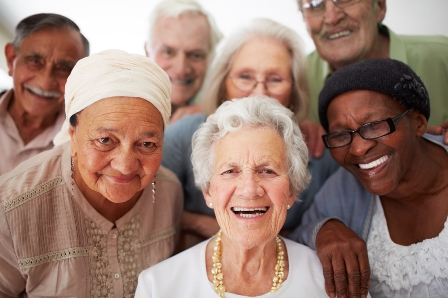
I had an experience today that was at the same time incredibly rewarding and intensely sad. I want to write about it both to highlight the issue and share a window into how I intend to lead if elected to the Board of Supervisors. Let’s talk…As individuals, I think we all fall short sometimes in terms of reaching the ideal of the type of human beings we want to be. I imagine even Mother Theresa probably checked herself in moments of quiet contemplation. This isn’t limited to individual people, I think we fall short as a community sometimes and today I took a break from raising money for my campaign to experience one glaring way we fall short and to learn from people who have lived more life than I have. I went to the Gary and Mary West Senior Center downtown to the Serving Seniors program and took a long, hard look in the mirror.
We – you, me, our friends, our colleagues, all of us – we are failing our seniors and shame on me if I said nothing. Well, most of us, anyway. There were a couple walls of people who clearly have been doing their part as patrons and supporters. Same for this angel of a volunteer named Fred Davis. The rest of us? We gotta step it up.
Campaigning is (or seems) mostly about raising money. It’s not terrible, but it’s not exactly a walk in the park. So the chance to sit down with people who understand important issues in our community is really terrific when it comes. I sat down with the CEO and two staff members at Serving Seniors. They gave me a tour of a homeless prevention program apartment building, pointed out several nearby affordable apartment homes…and reminded me that if you are a senior making $900/month (about the average for the people they serve), $700/month in rent isn’t exactly affordable. Not at all.
I learned again about the Elder Index, which is a more appropriate measure of what it costs to live in this community if you are a senior citizen. What jumps out very quickly – no great surprise – is that it is WAY more than the $10,800 average income I just mentioned. We talked about how to increase affordable senior homes, I met a man who was on the verge of being evicted from one of the few remaining Single Room Occupancy buildings downtown, and I also met a man named Eli who reminded me that judging a book by its cover – any book – is a mistake. This is true within the homeless community, too.
But to bring things full circle, I want to share with you that 40% of San Diego County’s senior citizens can’t afford the combination of transportation, housing, health care and food necessary to survive. 40% is not a typo. If we do nothing, that will equal 400,000 people in under 15 years. My passion is young people because that is where true equality is possible, but we aren’t doing many of our seniors any favors right now, either.
I started this post by talking about something that was both incredibly rewarding and intensely sad. At one of the multiple lunch seatings, where adults lined the halls for a chance to receive a hot, nutritious meal, I put on an apron, grabbed some gloves, and was grateful to serve a couple hundred people their lunch. I felt real joy being able to serve the men and women whose trays I delivered. They were thankful. I was thankful. I had an extra pep in my step because I wanted everyone to get this meal as fast as possible (there was a team of servers, not just me). This part of the story was the incredibly rewarding part. Looking a person in the face and calling them sir or ma’am as I thanked them for letting me serve them was a great experience. Many people volunteer, I don’t deserve any special credit for doing it, I’m just sharing my perspective. But what got me – what hit me in the chest when I finished rushing the trays back and forth was a deep, abiding sadness. I realized that everyone in that room – who’d come on San Diego’s woeful transit system from as far away as San Ysidro – was in such desperate need of nutritious food that this was the only way to get it. I don’t know who Gary and Mary West are, but I’m glad they exist. The only mitigation for my emotional roller coaster was taking a moment to realize that the grace and compassion of good people improved the lives of several senior citizens today.
At a policy level, we need to do much better than we are doing. And on a human level I feel strongly that when we see every senior as our own mother, grandmother, father, uncle, or family member we’ll develop the collective compassion necessary to make caring for our seniors more than a grant & philanthropy-funded afterthought. We’ll make it a fundamental part of who we are as a community. Thanks for reading.